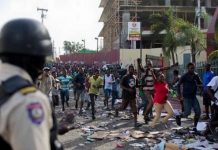By: Safiya Charles – The New Republic –
The tiny island nation of Trinidad and Tobago, like other U.S. allies in the region, is receiving large numbers of refugees.
Better known to most Americans for its picturesque beaches than its vast petrochemical reserves, Trinidad and Tobago boasts the most robust economy in the Caribbean. It has also, in the past year, become one of the premier destinations for Venezuelans trying to escape an escalating crisis.
In its ongoing attempt to push Venezuelan President Nicolás Maduro out of office, the Trump administration has appointed Elliott Abrams—a divisive former Reagan- and Bush-era official associated in Latin America with regime-change plots and atrocity coverups—as special envoy; has slapped Venezuela with additional sanctions; and has recognized opposition politician Juan Guaidó. According to one estimate, U.S. sanctions since 2017 have caused the deaths of at least 40,000 by restricting access to funds needed for food, medicine, and other essential imports.
Maduro remains in power. And Washington’s aggressive posture has exacerbated the refugee problem in the Caribbean, putting nations traditionally close to the U.S. in a difficult position that has brought issues of American paternalism to the fore and encouraged some to seek greater partnership with China—viewed as a less demanding and interventionist ally.
For decades, as economic forces have ebbed and flowed, people have emigrated freely between Venezuela and Trinidad and Tobago, separated by only seven nautical miles. As Venezuela’s economic crisis worsens, the island of 1.3 million has been overwhelmed by a surge of people attempting to avoid the fallout.
In June, a crowd of protestors gathered at a sports stadium in downtown Port of Spain. “Rowley must go. Close our borders. Rowley must go,” they chanted.
The chant echoed a rising tide of frustration among many Trinbagonian citizens, vexed by Prime Minister Keith Rowley’s weak response to what Refugees International has called the worst humanitarian crisis in the Americas in modern history. The United Nations estimates there are currently 4 million Venezuelans living abroad due to the crisis at home. Since 2017, some 40,000 to 60,000 have arrived in Trinidad and Tobago according to UN figures—the highest influx in the Southern Caribbean.
West of Trinidad, Aruba and Curaçao have also been inundated with large flows of people. As of January, the islands had received 16,000 and 26,000 refugees and migrants, respectively. Ill-equipped with porous borders and limited spatial capacity (Trinidad and Tobago is slightly larger than Rhode Island), small islands have struggled to formulate an adequate response. Even large South American nations like Peru, which along with Trinidad recently implemented visa restrictions on Venezuelan nationals, are beginning to buckle under the weight of the migrant flow.
The migrants themselves, meanwhile, are growing increasingly desperate. In the days prior to the protest at Queen’s Park Oval, thousands of undocumented Venezuelans had lined the unshaded block south of the stadium attempting to secure Rowley’s “amnesty”—a policy created by the administration promising freedom from deportation and a one-year work permit for all Venezuelan nationals that registered between May 31 and June 14, no matter their legal status. Those who were brave enough to answer the government’s call scrambled to reach one of only three centers—two in Trinidad and one in Tobago. Some spent their last dollars and waited for days in the hopes of submitting paperwork. As the temperature climbed above 90 degrees it was reported that some pregnant women and young children had collapsed.
Addressing the nation in May, Prime Minister Rowley vowed that “international agencies” would not convert the island into a refugee camp: “Trinidad and Tobago is a tiny dot in the mouth of the Orinoco River…. We are humanitarian, we are caring, we help. But the help that Trinidad and Tobago can give has to be limited. This little island cannot be the solution to millions or hundreds of thousands of migrants leaving Venezuela.”






